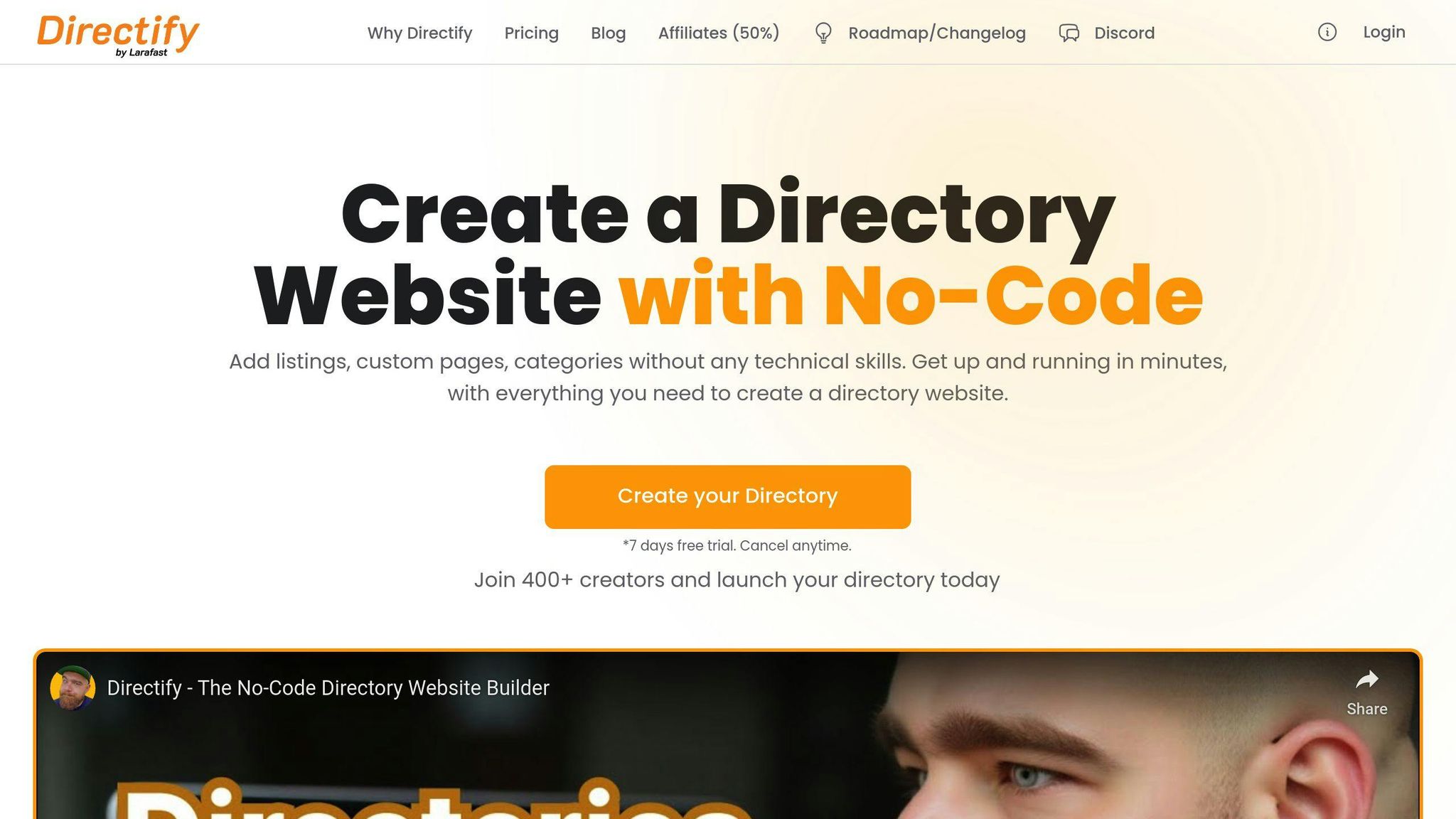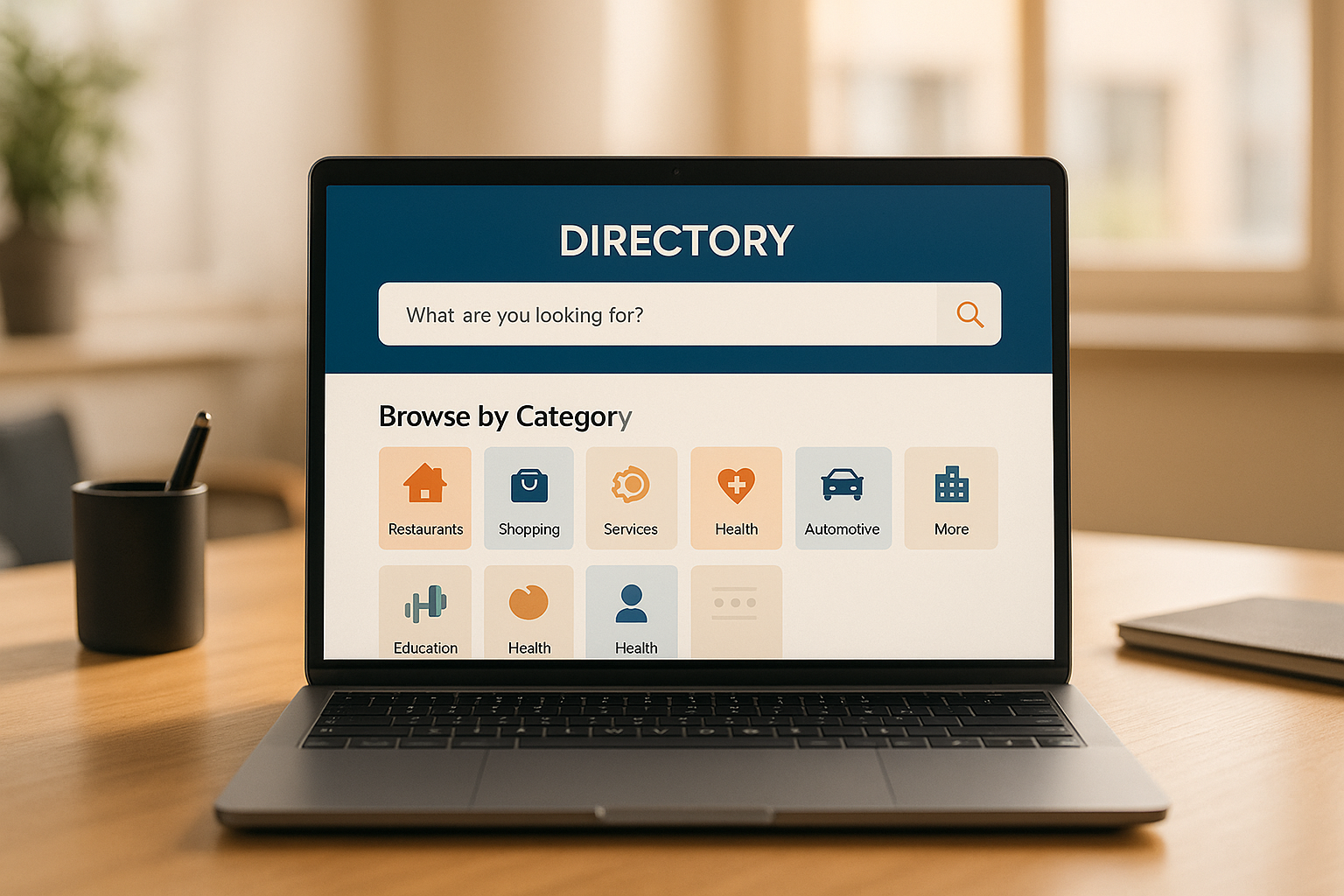

Directory websites and business directories may seem similar but serve different purposes. Here’s a quick breakdown:
Quick Comparison:
| Aspect | Directory Website | Business Directory |
|---|---|---|
| Focus | Broad categories (events, places) | Business-specific listings |
| Content | General information | Business profiles, services, products |
| Search Features | Basic filters | Advanced filters (location, reviews) |
| User Tools | Browsing | Reviews, ratings, verification |
| Monetization | Ads, affiliate marketing | Paid business listings |
| Data Accuracy | Basic moderation | Human-verified listings |
Choose based on your goals: for diverse content, go with a directory website. For business-focused needs, a business directory is better.
A directory website is a platform that organizes and categorizes information, making it easy for users to find what they need. Unlike other types of websites, these platforms focus on structured and navigable content [3].
Directory websites are built with features that improve usability and functionality, such as:
Directory websites are used in various industries to meet different needs. Here are some examples:
| Directory Type | Purpose | Key Features |
|---|---|---|
| Event Directories | List upcoming events and gatherings | Calendar views, event categories, media uploads |
| Academic Directories | Organize university staff and resources | Department categorization, contact details |
| Travel Guides | Showcase destinations and attractions | Location-based search, reviews, ratings |
Regular updates and maintenance are crucial for directory websites. Keeping information accurate not only builds trust but also encourages users to return to the platform as a reliable resource [5].
While general directory websites cater to a broad range of needs, they stand apart from more specialized options like business directories, which are tailored to a specific audience. This flexibility makes them a valuable tool for many sectors.
Business directories are online platforms designed specifically to list and organize businesses, making it easier for consumers to find products or services they need. Unlike general directories that cover a wide range of topics, these focus solely on commercial purposes, acting as a bridge between businesses and potential customers [3][1].
Business directories are packed with tools that make them useful for both businesses and consumers:
| Feature Category | Key Components | User Benefit |
|---|---|---|
| Search Functionality | Location filters, category search, keyword matching | Quickly find relevant businesses |
| Business Profiles | Contact details, operating hours, service descriptions | Access detailed business information |
| Verification Systems | Business validation, listing moderation | Build trust with accurate information |
What sets these directories apart is the involvement of human editors. They regularly review and update listings to ensure the information is accurate and reliable, making these platforms stand out from generic listing websites [1][8].
Here are two standout examples of how business directories are used effectively:
Yelp: Known for its extensive categorization and community-driven reviews, Yelp has transformed how people discover local businesses [2].
Google My Business: A must-have for local businesses, this platform offers:
Both platforms demonstrate how business directories cater to modern consumer needs. To make the most of these directories, businesses should ensure their profiles are complete, accurate, and optimized with relevant keywords [1][8].
Here's a breakdown of the key differences to help you choose the right platform:
| Aspect | Directory Website | Business Directory |
|---|---|---|
| Primary Focus | Covers a wide range of categories | Focused solely on business listings |
| Content Type | Includes people, places, events, and services | Features business profiles, services, and products |
| Search Features | Basic keyword and category search | Advanced filters and location-based searches |
| User Features | General browsing of information | Reviews, ratings, and business verification |
| Monetization | Depends on the platform (ads, premium listings) | Subscriptions and featured business listings |
| Data Verification | Basic moderation | Human editors and business validation processes |
| Update Frequency | Varies by platform | Requires regular updates |
These differences shape how each platform serves its audience and the value it offers.
The unique traits of each directory type affect their usefulness for different purposes.
Business-Focused Features
Business directories stand out in the commercial space. For instance, platforms like Yelp provide tools such as customer engagement analytics, which help businesses track interactions and improve services [2].
Content Management Practices
Directory websites allow for broader content organization but typically have less rigorous verification. In contrast, business directories enforce stricter standards with human editors regularly reviewing and validating listings [1][8].
User Experience
Business directories are designed to help users find specific services quickly. On the other hand, directory websites are better suited for exploring a wider range of information [3][4].
Choosing the Right Option
Deciding between these platforms depends on your goals. Businesses often gain more from directories tailored to consumer needs, while organizations may prefer the flexibility of directory websites. Users should pick based on whether they need detailed business profiles or general information [4].
The type of directory you choose should align with your audience's needs and the kind of content you plan to feature. Directory websites are versatile, handling a wide range of listings like articles, events, and attractions. On the other hand, business directories focus on structured business profiles, often including reviews and verification features [1][7].
When it comes to revenue, the approach differs. Business directories often rely on paid listings, while directory websites tap into multiple income sources, such as ads, affiliate marketing, and sponsored content [6].
Different scenarios call for different directory types. Here's a breakdown:
| Scenario | Recommended Type | Why It Works |
|---|---|---|
| Tourism Guide Platform | Directory Website | Showcases diverse listings like attractions and accommodations. |
| Local Service Provider Hub | Business Directory | Offers verified listings and review options. |
| Industry Resource Center | Directory Website | Combines articles, events, and service listings. |
| Professional Network | Business Directory | Focuses on verified profiles and networking tools. |
For platforms like local business hubs, business directories are ideal due to their verification features and monetization options [6].
Once you've settled on a directory type, think about the technical side of things. no-code directory builder tools can make setup easier, but business directories often require ongoing maintenance, especially for verification processes [2].
You'll need to evaluate your available resources, including technical expertise and content management capabilities. Regular updates and verification are crucial for business directories, so ensure you can manage these tasks effectively. The goal is to choose a directory type that fits your needs while being manageable in the long run.
If you're creating a general directory website or a business-specific one, these tools provide options tailored to the features and functionality you need.

Directify is a no-code platform built specifically for directory creation. With pricing starting at $24.5/month for a single directory plan, it offers:
This platform is ideal for non-technical users who want a professional directory solution [1].
WordPress provides several options for building directories through specialized themes and plugins:
| Solution | Best For | Key Features |
|---|---|---|
| ListingPro | Complex directories | Offers customization, verification, and payment integration |
| Templatic's Business Directory | Simple business listings | Features a user-friendly interface, easy setup, and basic monetization tools |
For those who prefer no-code solutions, Webflow delivers design flexibility and custom interactions, allowing for unique layouts. Meanwhile, Squarespace combines ease of use with professional features, making it a great choice for small business directories [1][7].
These tools make it easier to create a directory that fits your specific requirements, whether your focus is on design, simplicity, or advanced features.
Now that we've covered the tools and strategies for building directories, it's time to think about how to pick the right type to match your goals. Tools like Directify have made creating directories easier than ever, so the real challenge lies in tailoring your directory to your audience.
The type of directory you choose plays a big role in meeting your audience's needs. While directory websites offer a wider range of content and categories, business directories are more focused on commercial listings.
Here are a couple of things to keep in mind:
Purpose and Scope: Directory websites are great for organizing all kinds of information, while business directories zero in on commercial listings with features like location-based searches and user reviews.
Functionality Needs: Business directories often need tools like map integration and user verification. On the other hand, directory websites focus more on categorization and managing diverse content.
Modern tools like Directify and ListingPro make creating directories straightforward. Examples like TripAdvisor and Yelp show how directories can effectively cater to niche or business-oriented audiences [1][6].
Ultimately, your directory's success will come down to aligning its type with your goals. Whether you're building a broad resource or a business-specific platform, having the right tools and a clear vision will help you deliver value to your users.
Start creating your professional directory website today with Directify's no-code platform.
Get Started Free







